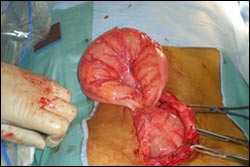Institute Of
Gastroenterology
Home » The Institute of Gastroenterology, Hepatobiliary Science & Transplantation » Surgical Gastroenterology » Colorectal Surgery
Colorectal Surgery
Colorectal surgery is required for disorders of the colon, rectum, and anus. Common surgical treatments include colectomy, polypectomy, ileo/colostomy, strictureplasty, angioplasty, and hemorrhoidectomy. A new surgical method called Compression Anastomotic Ring-locking Procedure (CARP) is also a preferred choice.
Surgery for Familial polyposis coli:
Familial polyposis coli, also known as familial adenomatous polyposis, is a rare genetic colon illness characterized by numerous polyps throughout the colon. This illness has a significant risk of becoming cancerous, the colon and rectum must be completely removed. Bowel continuity is restored by performing an ileoanal pouch. This procedure is done as a preventative measure when polyps are discovered, which is mainly in teenagers. Total abdominal colectomy with ileorectal anastomosis, total proctocolectomy with end ileostomy, total proctocolectomy with ileal pouch-anal anastomosis, and total proctocolectomy with a continent ileostomy are the four surgical options available.


Surgery for ulcerative colitis:
Ulcerative colitis is a chronic inflammatory illness of the large intestine with a wide range of symptoms. It usually begins in the rectum and progresses to the caecum. In India, the majority of patients have a milder form of ulcerative colitis that affects only the left colon and responds to oral therapy. Some of these patients arrive in the emergency room with severe symptoms that necessitate hospitalization and, in some cases, surgery for illnesses such as “toxic megacolon,” “massive lower GI bleeding, etc. Surgery will involve total colectomy with ileostomy. The entire colon and rectum are removed during elective surgery for significant ulcerative colitis, pancolitis, or cancer in a setting of ulcerative colitis, and the usual continuity is restored by creating an ‘ileoanal pouch.’ Brooke ileostomy or continent ileostomy are usually required for this operation.
Surgery for diverticulitis:
Diverticulitis is a condition usually seen in the old where areas of weakness develop in the sigmoid and ascending colon resulting in localized ballooning of colonic mucosa called diverticulosis. Diverticulitis is caused by infection and inflammation of these diverticula. If you have a colonic obstruction, a colo-vesical fistula, or excessive bleeding, you may need surgery. A partial colectomy and anastomosis are part of the surgery. Diverticulitis surgery is advised if the patient has had multiple incidents of diverticulitis, an abnormal fistula develops between the colon and the adjacent organ, or if the patient has an immune system that makes them vulnerable to diverticulitis attacks.

Surgery for Cancer of Colon and rectum:
Cancer can affect any section of the large intestine and is one of the most prevalent diseases of the colon and rectum. The primary treatment option is the surgical removal of cancer. Rectal malignancies will necessitate the removal of the entire rectal equipment and the placement of a permanent end colostomy. Surgical staplers can help protect the anal sphincter mechanism in some rectal tumors. Colon cancers will necessitate the removal of a section of the colon called a right or left hemicolectomy. In the early stages of rectal cancer, local or transanal resection is used. The APPEAR technique — Anterior Perineal PlanE for Ultra-low Anterior Resection. Other surgical treatments for rectal cancer include transanal endoscopic microsurgery and total mesorectal excision.

